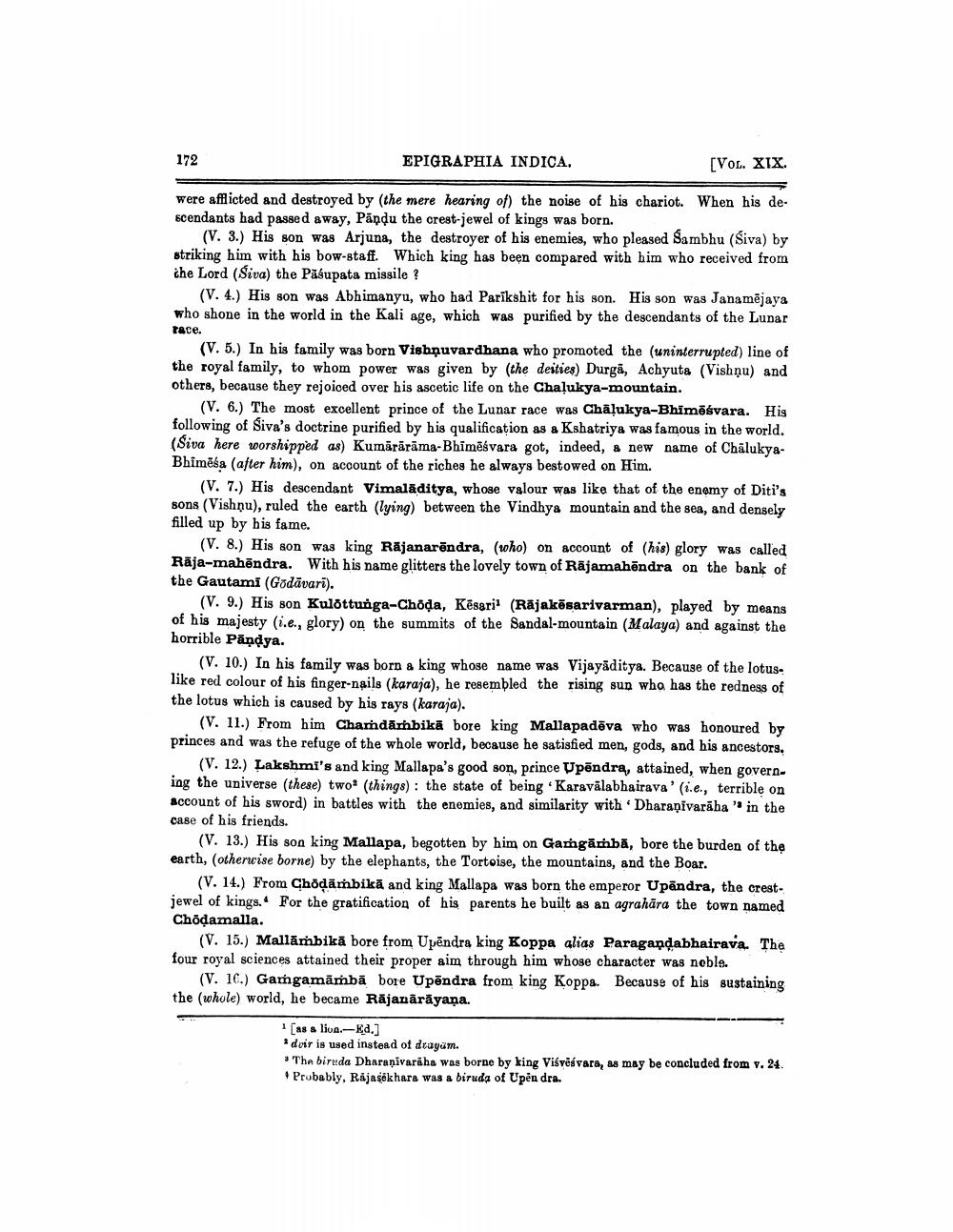________________
172
EPIGRAPHIA INDICA,
[VOL. XIX.
were afflicted and destroyed by the mere hearing of the noise of his chariot. When his descendants had passed away, Pandu the crest-jewel of kings was born.
(V. 3.) His son was Arjuna, the destroyer of his enemies, who pleased Sambhu (Śiva) by striking him with his bow-staff. Which king has been compared with him who received from che Lord (Siva) the Păśupata missile ?
(V. 4.) His son was Abhimanyu, who had Parikshit for his son. His son was Janamējaya who shone in the world in the Kali age, which was purified by the descendants of the Lunar race.
(V. 5.) In his family was born Vishnuvardhana who promoted the (uninterrupted) line of the royal family, to whom power was given by the deities) Durgā, Achyuta (Vishņu) and others, because they rejoiced over his ascetic life on the Chalukya-mountain.
(V. 6.) The most excellent prince of the Lunar race was Chalukya-Bhimēśvara. His following of Siva's doctrine purified by his qualification as a Kshatriya was famous in the world. (Siva here worshipped as) Kumārārāma-Bhimēśvara got, indeed, & new name of ChālukyaBhimēsa (after him), on account of the riches he always bestowed on Him.
(V. 7.) His descendant Vimalāditya, whose valour was like that of the enemy of Diti's sons (Vishnu), ruled the earth (lying) between the Vindhya mountain and the sea, and densely filled up by his fame.
(V. 8.) His son was king Rājanarēndra, (who) on account of (his) glory was called Rāja-mahēndra. With his name glitters the lovely town of Rājamahēndra on the bank of the Gautami (Godāvari).
(V. 9.) His son Kulottunga-Choda, Kēsari (Räjakēsarivarman), played by means of his majesty (i.e., glory) on the summits of the Sandal-mountain (Malaya) and against the horrible Pandya.
(V. 10.) In his family was born a king whose name was Vijayāditya. Because of the lotus. like red colour of his finger-nails (karaja), he resembled the rising sun who has the redness of the lotus which is caused by his rays (karaja).
(V. 11.) From him Chardānhbikā bore king Mallapadēva who was honoured by princes and was the refuge of the whole world, because he satisfied men, gods, and his ancestors.
(V. 12.) Lakshmi's and king Mallapa's good son, prince Upēndra, attained, when govern. ing the universe (these) two things) : the state of being Karavālabhairava' (ie, terrible on account of his sword) in battles with the enemies, and similarity with Dharanivarāha '' in the case of his friends.
(V. 13.) His son king Mallapa, begotten by him on Gamgāmbă, bore the burden of the earth, (otherwise borne) by the elephants, the Tortoise, the mountains, and the Boar.
(V. 14.) From Chôdāmbikā and king Mallapa was born the emperor Upāndra, the crestjewel of kings. For the gratification of his parents he built as an agrahāra the town named Chodamalla.
(V. 15.) Mallămbikā bore from Upēndra king Koppa alias Paragandabhairava. The four royal sciences attained their proper aim through him whose character was neble.
(V. 16.) Gamgamāṁbā bore Upēndra from king Koppa. Because of his sustaining the (whole) world, he became Rājanārāyana.
(as a liva.-Ed.] * dvir is used instead of duyum. * The biruda Dharaņivaráha was borne by king Visvēśvara, as may be concluded from . 24 * Probably, Rajasekhara was a biruda of Upendra.




